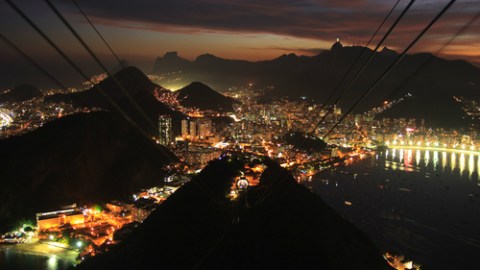The Automation of Rio: Smart City or Digital Tyranny?

What’s the Big Idea?
Around half of the world’s population currently lives in urban settings, and it has been projected to increase to two-thirds, or 6 billion people, by 2050. The challenge of taking care of all these future city inhabitants will be enormous. Will we see the proliferation of dystopian mega-slums or the triumph of so-called smart cities?
How can technology help us? And how can we merge new technology with a desirable human environment?
For a sneak peak into what the city of the future will look like, let’s consider the city that is playing host to the World Cup in 2014 and the Olympics in 2016. That city is Rio de Janeiro, and the pressure of getting ready for the games is taking its toll. The city has undergone a dramatic facelift, as favelas (or shantytowns) have been bulldozed to make way for Olympic venues.
And yet, other changes have been taking place under the radar. As Sebastian Anthony wrote in Extreme Tech:
For nearly two years, Rio de Janeiro’s utilities, traffic systems, and emergency services has been managed by a single ‘Ops Center,’ a huge hub of technologies provided by both IBM and Cisco. With 300 LCD screens spread across 100 rooms, connected via 30,000 meters of fiber optic cable, Ops Center staff monitor live video from 450 cameras and three helicopters, and track the location of 10,000 buses and ambulances via GPS. Other screens output the current weather, and simulations of tomorrow’s weather up to 150 miles from the city — and yet more screens display heatmaps of disease outbreaks, and the probability of natural disasters like landslides. There’s even a Crisis Room, which links the Ops Center to Rio’s mayor and Civil Defense departments via a Cisco telepresence suite. This sounds awesome — but is it really a good idea to give a computer company (IBM is not an urban planner!) so much control over one of the world’s biggest cities?”
What’s the Significance?
Let’s start with the awesome part. Automation could run public utilities and transportation systems with amazing efficiency. But then there’s the Big Brother part. Some worry that companies with huge contracts could run cities like ‘digital tyrants.’ Imagine trying to talk your way out of a parking ticket with a robot that has no empathy.
This debate is a real and necessary one to have right now, because, after all, we’re seeing the automated city begin to take shape right now in Rio. This particular story also gets to the heart of one of the great questions of our time, which is how can technology enhance, rather than take away from our humanity?
Big Think has posed this question in an online Expo called Humanizing Technology, which seeks to identify the technologies that do the best job of fulfilling our core human needs.
You can view this series here.





